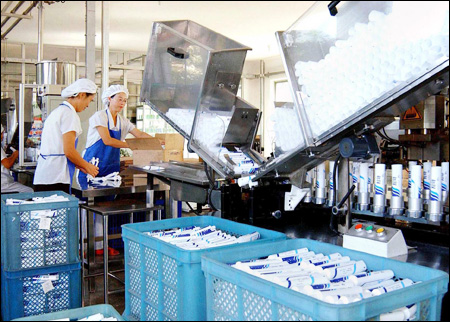North Korea phases out ‘strong and prosperous’ claim

This picture taken by the North Korean media in September shows workers in a factory in Pyongyang manufacturing cosmetic products. (Photo : Yonhap)
North Korea is not known to shy away from hyperbole. The impoverished country, after all, boasts that the late despot Kim Jong-il scored 11 hole-in-ones during his first round of golf.
It appears to be taking a more measured tone, however, on its long-held claim that it will emerge a “strong and prosperous state” this year. Watchers say it is reducing its use of the phrase out of concern over possible public fatigue and emphasizing economic development instead.
The watchers say major media mouthpieces such as the Korean Central News Agency, Korean Central Television and Rodong
Sinmun have phased out the phrase since Kim’s death in December. Since then, his son Kim Jong-un, has sought to paint a vision of a “new era” that will focus on catching up with “global trends.”
Among its last seen appearances, “Uriminzokkiri,” a China-based website that carries North Korean news to the world, urged last month for the country to adhere to a military-first doctrine to achieve a “shining victory” for the construction of a “strong and prosperous state.”
The phrase (“gangseong daeguk” in Korean) has been replaced by a slightly less lofty version. The media more often uses the term “gangseong gukga,” which while having a similar meaning, takes some of the pomp out of the phrase.
“The (original) phrase is symbolic of the Kim Jong-il era,” Yoo Ho-yeol, a North Korea expert at Korea University said. “I think Kim Jong-un would like to be more realistic and pragmatic and will use the term less.”
At the tail end of a famine that killed hundreds of thousands, the senior Kim rolled out the phrase in 1998 as a pillar of his regime, putting forth the goal of ideological and military superiority along with economic strength.
For years it promised it would achieve the lofty status by April in time for celebrations for the 100th anniversary of its founder Kim Il-sung. But amid ongoing food shortages and economic sanctions, it began tailoring its language, saying it would “open the gate” to prosperity by then.
While the regime siphoned resources into grand improvements for the capital city ahead of the celebrations, the economic situation remains grim, with lack of goods and poor harvests causing inflation to soar.
Park Young-ho, an analyst at the Korea Institute for National Unification, said the shift in language reflected prioritization on the “prosperous” portion of the equation, after the regime credited the senior Kim for beefing up deterrence.
“While Kim Jong-il was successful in building a nuclear weapons program, he failed to improve living conditions. So Kim Jong-un can say his main task is to develop the economy,” he said.
The regime last month passed laws to reform its educational system, in what analysts said was a bid to help young North Koreans catch up to the rest of the world in areas such as technology, science and foreign language.
While such moves may indicate the new leader’s wish to become more pragmatic, analysts say he is challenged by the dire economic situation and the need for currency to stabilize the economy. <The Korea Times/Kim Young-jin>



















































